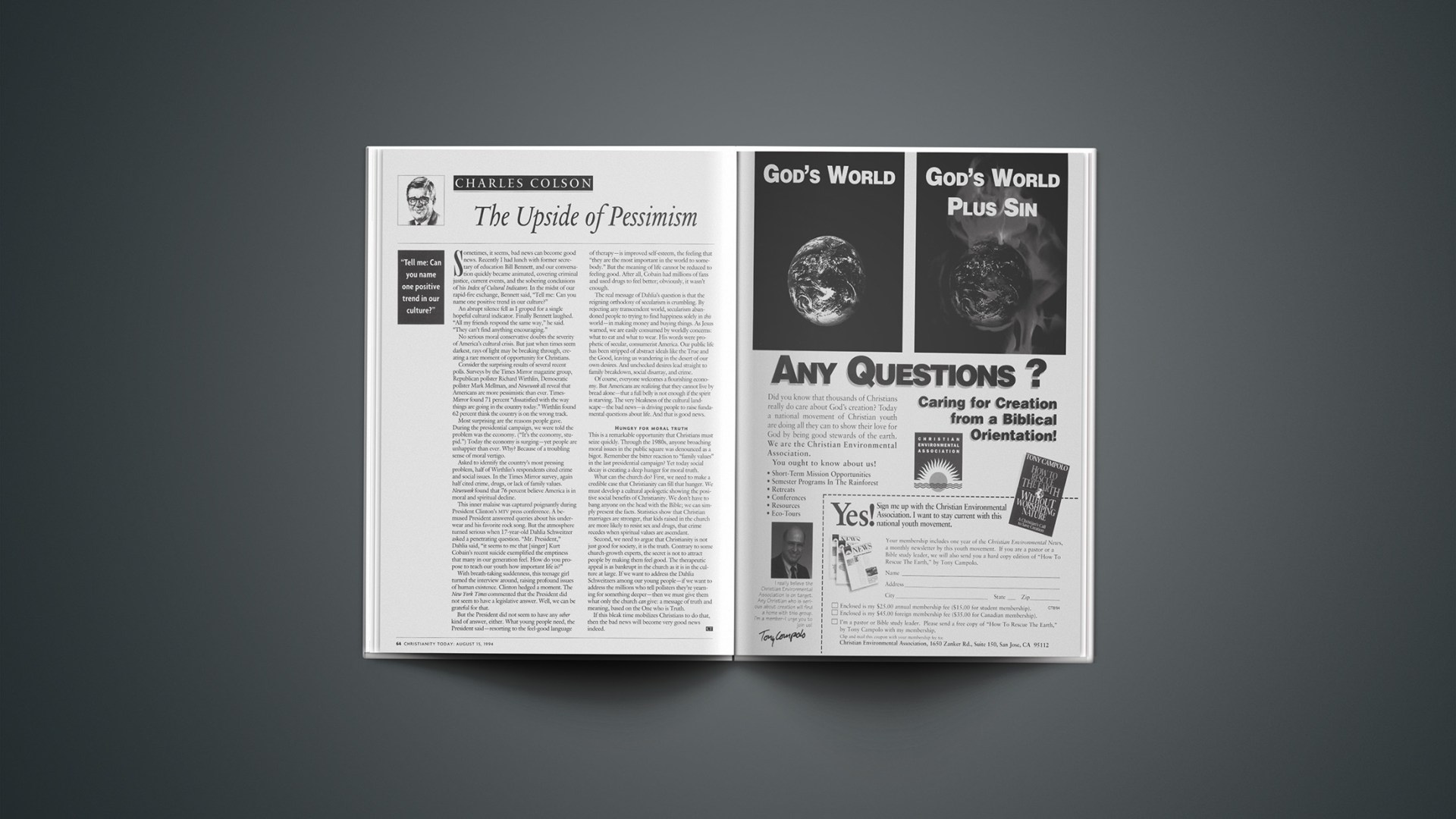Sometimes, it seems, bad news can become good news. Recently I had lunch with former secretary of education Bill Bennett, and our conversation quickly became animated, covering criminal justice, current events, and the sobering conclusions of his Index of Cultural Indicators. In the midst of our rapid-fire exchange, Bennett said, “Tell me: Can you name one positive trend in our culture?”
An abrupt silence fell as I groped for a single hopeful cultural indicator. Finally Bennett laughed. “All my friends respond the same way,” he said. “They can’t find anything encouraging.”
No serious moral conservative doubts the severity of America’s cultural crisis. But just when times seem darkest, rays of light may be breaking through, creating a rare moment of opportunity for Christians.
Consider the surprising results of several recent polls. Surveys by the Times Mirror magazine group, Republican pollster Richard Wirthlin, Democratic pollster Mark Mellman, and Newsweek all reveal that Americans are more pessimistic than ever. Times-Mirror found 71 percent “dissatisfied with the way things are going in the country today.” Wirthlin found 62 percent think the country is on the wrong track.
Most surprising are the reasons people gave. During the presidential campaign, we were told the problem was the economy. (“It’s the economy, stupid.”) Today the economy is surging—yet people are unhappier than ever. Why? Because of a troubling sense of moral vertigo.
Asked to identify the country’s most pressing problem, half of Wirthlin’s respondents cited crime and social issues. In the Times Mirror survey, again half cited crime, drugs, or lack of family values. Newsweek found that 76 percent believe America is in moral and spiritual decline.
This inner malaise was captured poignantly during President Clinton’s MTV press conference. A bemused President answered queries about his underwear and his favorite rock song. But the atmosphere turned serious when 17-year-old Dahlia Schweitzer asked a penetrating question. “Mr. President,” Dahlia said, “it seems to me that [singer] Kurt Cobain’s recent suicide exemplified the emptiness that many in our generation feel. How do you propose to teach our youth how important life is?”
With breath-taking suddenness, this teenage girl turned the interview around, raising profound issues of human existence. Clinton hedged a moment. “The New York Times” commented that the President did not seem to have a legislative answer. Well, we can be grateful for that.
But the President did not seem to have any other kind of answer, either. What young people need, the President said—resorting to the feel-good language of therapy—is improved self-esteem, the feeling that “they are the most important in the world to somebody.” But the meaning of life cannot be reduced to feeling good. After all, Cobain had millions of fans and used drugs to feel better; obviously, it wasn’t enough.
The real message of Dahlia’s question is that the reigning orthodoxy of secularism is crumbling. By rejecting any transcendent world, secularism abandoned people to trying to find happiness solely in this world—in making money and buying things. As Jesus warned, we are easily consumed by worldly concerns: what to eat and what to wear. His words were prophetic of secular, consumerist America. Our public life has been stripped of abstract ideals like the True and the Good, leaving us wandering in the desert of our own desires. And unchecked desires lead straight to family breakdown, social disarray, and crime.
Of course, everyone welcomes a flourishing economy. But Americans are realizing that they cannot live by bread alone—that a full belly is not enough if the spirit is starving. The very bleakness of the cultural landscape—the bad news—is driving people to raise fundamental questions about life. And that is good news.
HUNGRY FOR MORAL TRUTH
This is a remarkable opportunity that Christians must seize quickly. Through the 1980s, anyone broaching moral issues in the public square was denounced as a bigot. Remember the bitter reaction to “family values” in the last presidential campaign? Yet today social decay is creating a deep hunger for moral truth.
What can the church do? First, we need to make a credible case that Christianity can fill that hunger. We must develop a cultural apologetic showing the positive social benefits of Christianity. We don’t have to bang anyone on the head with the Bible; we can simply present the facts. Statistics show that Christian marriages are stronger, that kids raised in the church are more likely to resist sex and drugs, that crime recedes when spiritual values are ascendant.
Second, we need to argue that Christianity is not just good for society, it is the truth. Contrary to some church-growth experts, the secret is not to attract people by making them feel good. The therapeutic appeal is as bankrupt in the church as it is in the culture at large. If we want to address the Dahlia Schweitzers among our young people—if we want to address the millions who tell pollsters they’re yearning for something deeper—then we must give them what only the church can give: a message of truth and meaning, based on the One who is Truth.
If this bleak time mobilizes Christians to do that, then the bad news will become very good news indeed.
Copyright © 1994 Christianity Today. Click for reprint information.









